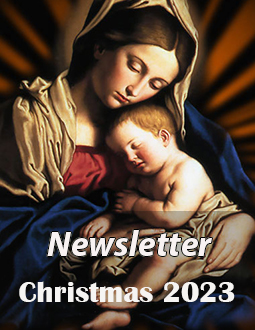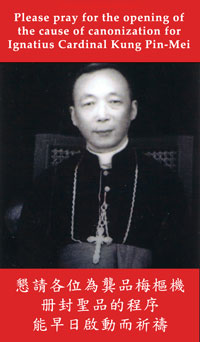Guidelines on China from the Vatican
Issued by Josef Cardinal Tomko
September 3, 1988
![]()
(These Guidelines have been revoked by Pope Benedict the XVI's Letter to the Chinese Church signed on May 27, 2007 and released on June 30, 2007)
![]()
SACRA CONGREGATIO
PRO GENTIUM EVANGELIZATIONE
SEU DE PROPAGANDA FIDE
Prot. 3314/88
Rome, 3 September, 1988
During the last few years the attention of Catholics and international opinion has been drawn by the news of the complex reality of the Catholic Church in China.
Furthermore, the visits of various delegations of 'patriotic' Chinese Catholics to Europe, Canada and the United States have induced the Episcopal Conferences of the Countries concerned to address the Holy See for clarifications and directives.
This Congregation for the Evangelization of Peoples, in accord with the Council for the Public Affairs of the Church, considers it its duty to bring to your knowledge some data, as well as various indications which could be useful.
As you are aware, when in 1949 communism gained power in Continental China, the Catholic Church had around three million faithful distributed in 144 ecclesiastical circumscriptions, forty of which were entrusted to Chinese Bishops, priests numbered 5800, of whom 2700 Chinese, and religious sisters 6753; numerous were the educational, health, and welfare institutions.
As soon as Mao Tse Tung assumed full control of the entire continental territory, the non Chinese Bishops and all the missionaries were imprisoned and then expelled.
Many Bishops, priests and laity of Chinese origin were arrested, condemned to long penal detention or sent to camps of re-education. Not a few died in prison.
The situation of the Church grew worse during the following years when the regime of Peking promoted the rise of the 'movement of the three autonomies' (1951), whose principles of self-government, self-propagation, and self-financing inspired during the subsequent years (1957) the constitution of the 'Patriotic Association of Chinese Catholics', with the declared intention of giving life to a "Catholic Church" without links with the supreme Pontiff and the Holy See, under the full control of the governing authority.
With this aim in view, the Association promoted the nomination and Episcopal ordination of new Bishops who had neither been chosen nor confirmed by the Supreme Pontiff.
A few recent positions taken up by certain leaders of the Patriotic Association seem to indicate some changes in attitude and the assumption on the part of the Patriotic Association of a more political role, as an organ of communication between the Catholic Church in China and the Government. Nevertheless, official declarations of representatives of the Patriotic Association and the fact that the Association still guides the choice and ordination of Bishops in each diocese and maintains control over the activities of the various diocesan communities, still demonstrate that the same difficulties are continuing.
Actually, after the dolorous period of the cultural revolution, the situation of the Catholic Church in China presents complex forms, which are not always clear.
On the one hand, there exists an 'official' Church, recognized by the Government which, being founded on the 'autonomous' process promoted by the governing authorities, has some fifty Bishops, numerous churches open to the cult and various regional and diocesan seminaries inaugurated during these last years.
On the other hand, there exists and is actively operating a 'faithful' Church, which some are calling an 'underground' Church, and which remains faithful to its ties of full communion and hierarchical belonging to the Roman Pontiff: a religious bond which is an essential part of the Catholic Faith. The majority of the Chinese Catholics belong to this second group.
And then there exist in the interior of the first group priests and faithful who are promoters of an intermediate way: they conserve in their hearts as unrelinguishable their bonds of communion with the Holy Father, as well as accepting the religious policy imposed by the Authorities.
At present, the Authorities of Peking do not permit the Holy See to have rapports with the 'faithful' Church and not even with the 'official' Church.
As the contacts among members of the Episcopate, priests and faithful, with exponents of the Catholic Church in China are becoming ever more frequent, this Dicastery, in accord with the Council for the Public Affairs of the Church, considers it opportune to give the Episcopal Conferences the following indications:
- The contacts in question could be a good occasion to reaffirm with clarity the Catholic Doctrine on the communion which must unite the Bishops with the Successor of Peter and, through him, among themselves (L. G. 14 & 18). In this regard, one could have recourse to the doctrinal principles of the Vatican Councils I and II.
- In the light of the Vatican Council II one could also explain to them how the Church realizes in her own life self-government, self-propagation and self-financing: it is normal today that Bishops be chosen from among the local clergy; evangelization is, in the first place, to be realized by the local churches, even if in many cases the collaboration of the missionaries still remains necessary, but in a subordinate position; that it is evident that the Church be financially supported by the offerings of the faithful in the locality.
- Mention could also be made to them of the various forms of collegiality which are being developed in the Church, particularly since Vatican Council II, both on the national and regional levels through the Episcopal Conferences, and on the universal level through the presence and collaboration of the Episcopates of the various countries in the central government of the Church, as, for example, their presence in the Roman Dicasteries, and their collaboration in the Synod of Bishops.
- In the course of various encounters, care must be taken to avoid attitudes which could wound the sensibility of the 'silent' majority of those Catholics who have suffered and are suffering for their fidelity to the Holy Father.
There is also need of avoiding that the visits in question do not become instrumental in obtaining recognition and the legitimization of a position which cannot in any way be acceptable either on the doctrinal level or disciplinary and canonical levels.
- Another rather delicate point is the question of the liturgical celebrations. In fact all 'communicatio in sacris' is to be avoided. The 'patriotic' bishops and priests are not to be invited or even allowed to celebrate religious functions in public, either in the churches or in the oratories of the various religious institutes.
- The necessary clarity regarding the ecclesial aspects of the visits and the attitude to be adopted, which must be respected by all, do not imply that there is to be a lack of fraternal charity, which should be expressed in the cordiality of the welcome given to the guests and in the manner in which they are treated.
It is hoped that all this will assist them in understanding, in the light of the Spirit, the incoherence of their position and induce them to a change of attitude.
- Care must also be taken that those who are responsible for the organization of the visits of the above-mentioned delegations be persons of sound doctrine, faithful to the Magisterium of the Church and capable of acting with great prudence.
- It is to be foreseen that such events will not fail to arouse reactions in the local and international press. It will be necessary, therefore, to foresee how to assist the means of social communication, utilizing the orientations mentioned above, which clarify the position of the Church and may foster the comprehension of the diverse and complex problems closely connected with this position.
I am enclosing herewith the text of the directives on some of the problems of the Church in Continental China", prepared at the request of the Holy Father and approved by him.
The document in question represents the reply to some requests which Chinese Bishops have repeatedly made to the Holy See. However, it may be opportunely used also for what concerns the relationships with the ecclesiastics of Continental China who go on visits abroad, as well as the ecclesiastics of the various countries who more frequently visit that Nation.
This letter has been drafted by the competent Congregation for the Evangelization of Peoples in accord with the Council for the Public Affairs of the Church. Its contents, as well as the contents of the enclosed "directives", could be made known to the Bishops of that Nation and, through them, to the priests, both diocesan and religious, more directly concerned. Nevertheless, given the delicate nature of the matter, use should be made of them in a discreet and reserved manner.
In view of the great interest with which the Holy See follows the situation of the Church in China, the Congregation for the Evangelization of Peoples would be pleased if, subsequently, your Episcopate could forward any possible useful information it might have in its regard.
With sentiments of personal esteem and every best wish, I remain,
Yours sincerely in Our Lord,
Josef Card. Tomko
Pref. (Signed)




